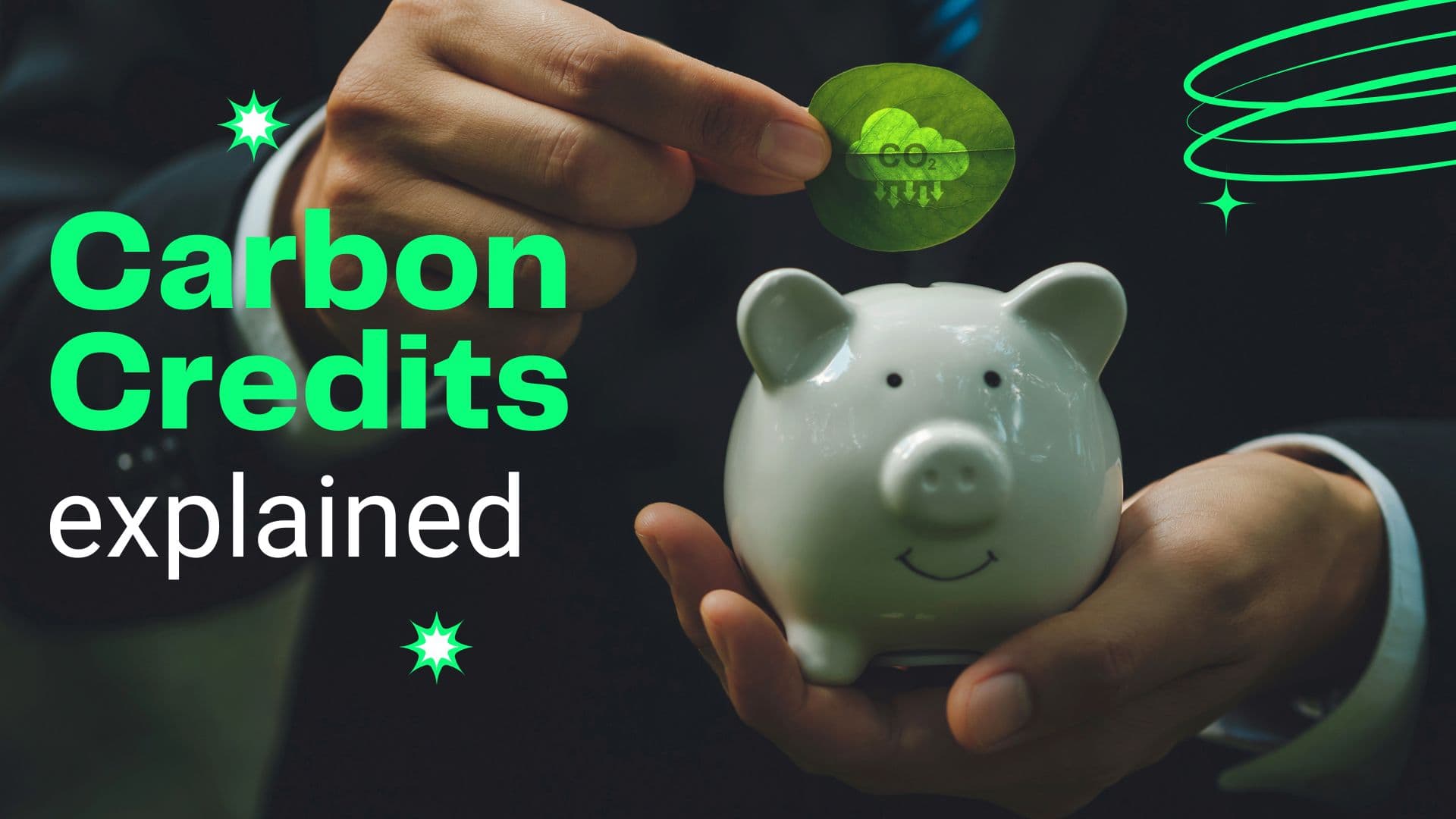
Carbon credits, CO2 certificates, and carbon offsets are becoming essential tools for businesses striving to reduce their carbon footprint. Whether due to regulatory requirements, consumer expectations, or corporate social responsibility goals, organizations are looking for effective ways to mitigate their greenhouse gas emissions.
One powerful tool that has emerged to address this challenge is the use of these mechanisms through the carbon trading mechanism. But how do these mechanisms work, and how can your business benefit from them? Let’s break it down one-by-one.
What Are Carbon Credits and CO2 Certificates?
Carbon credits and CO2 certificates represent a tradable unit that equals one metric ton of carbon dioxide (CO2) or its equivalent gases. These credits are part of a carbon trading mechanism, which allows companies to buy or sell credits based on their emissions. Organizations with lower emissions can sell their surplus credits to those exceeding their limits, encouraging a market-driven approach to emission reductions.
Regulatory frameworks such as the EU Emissions Trading System (EU ETS) and voluntary programs provide structured ways for businesses to engage in carbon trading. Compliance markets, like those governed by the Kyoto Protocol and Paris Agreement, ensure that industries stay within their legally permitted emission limits.

How Do Carbon Offsets Work?
Carbon offsets function similarly to carbon credits but are typically voluntary actions taken by businesses or individuals to balance their carbon footprint. This can involve investing in environmental projects such as reforestation, renewable energy initiatives, or methane capture programs, which actively remove or prevent emissions from entering the atmosphere.
Offset credits can be purchased to compensate for emissions generated by travel, manufacturing, or other operational activities, helping organizations achieve carbon neutrality or even become climate-positive.

For example, if your company produces 1,000 metric tons of CO2 per year and invests in a wind farm that prevents the release of an equivalent amount of emissions, you can claim “carbon neutrality“. Therefore, offsets are particularly useful for companies that find it challenging to reduce emissions from certain operations.
Check out our guide on voluntary carbon offsets, to learn more!
💡 Be careful not to make bold claims about carbon neutrality and Net Zero as this can easily be seen as unlawful greenwashing!
Carbon Credits vs Carbon Offsets
Carbon offsets and carbon credits serve different purposes in sustainability efforts, though they are often used interchangeably. In essence, carbon credits are compliance-driven and governed by regulations, while carbon offsets provide a voluntary means to counterbalance emissions.
Carbon offsets are primarily used by companies and individuals to voluntarily compensate for their emissions by investing in projects that remove or reduce greenhouse gases from the atmosphere.
These projects may include initiatives like forest conservation, renewable energy installations, or methane capture. Offsets are purchased in the voluntary market to achieve carbon neutrality or corporate sustainability goals.

Carbon credits, on the other hand, are typically part of a regulated system where businesses must adhere to specific emission reduction targets that cap their emissions. They are tradable permits that allow organizations to emit a certain amount of greenhouse gases.
Companies that exceed their allowed emissions must purchase additional credits, while those that reduce emissions can sell their excess credits within compliance markets.
Understanding the Carbon Trading Mechanism
The carbon trading market operates in two key segments: compliance markets and voluntary markets:
- Cap-and-Trade System: A regulatory limit (cap) is set on emissions, and businesses must stay within these limits. They can trade allowances based on their actual emissions.
- Baseline-and-Credit System: Organizations that operate below their set baseline earn credits that can be sold to those exceeding their limits.
Compliance markets are regulated by governments and often include mandatory carbon caps, while voluntary markets allow companies to offset emissions voluntarily to enhance sustainability credentials.
In compliance markets, businesses receive emission allowances that they can trade with others, creating an incentive to reduce emissions and sell excess credits. Voluntary markets, on the other hand, offer businesses flexibility to support various environmental projects that align with their sustainability goals.
This trading mechanism incentivizes businesses to find innovative ways to reduce emissions while providing flexibility in achieving sustainability targets.
Why Your Business Should Consider Carbon Offsetting
As sustainability becomes a key business priority, investing in carbon offsets and trading mechanisms can offer numerous benefits:
Enhance Brand Reputation: Consumers are becoming more eco-conscious, and demonstrating a commitment to sustainability can build trust and loyalty.
Regulatory Compliance: Many industries are subject to strict environmental regulations, and offsetting can help ensure compliance with emission limits.
Cost Savings: Companies that proactively manage emissions can save costs in the long run by avoiding penalties and benefiting from energy-efficient practices.

Carbon Market Trends
Rising Demand for Carbon Credits
As more companies commit to net-zero goals, the demand for carbon credits is steadily increasing. Businesses across industries are integrating carbon credits into their sustainability strategies to comply with regulatory frameworks and demonstrate environmental responsibility.
Price Volatility and Market Dynamics
Carbon credit prices are subject to fluctuations based on regulatory changes, supply-demand dynamics, and evolving climate policies. Companies must stay informed about market trends to optimize their carbon trading strategies and avoid unexpected cost increases.
Advancements in Carbon Removal Technologies
New technologies such as direct air capture and biochar are emerging as effective solutions for carbon removal. Businesses investing in these technologies can generate high-quality carbon credits, positioning themselves as leaders in sustainability innovation.

Expanding Voluntary Markets
Voluntary carbon markets are experiencing growth as organizations seek to offset emissions beyond regulatory requirements. This expansion presents opportunities for businesses to invest in meaningful climate action while enhancing their corporate image.
Challenges in Carbon Trading
Regulatory Complexity
Navigating the complexities of compliance markets can be challenging for businesses unfamiliar with emission regulations. Understanding evolving policies and market mechanisms requires expertise and continuous monitoring.
Ensuring Project Credibility
Not all carbon offset projects deliver the promised impact. Businesses must ensure they invest in verified and credible projects that provide measurable emission reductions to avoid accusations of greenwashing.
Financial Considerations
The cost of carbon credits and offsets can vary significantly, making it crucial for companies to balance financial investments with sustainability goals. Strategic planning and careful budgeting are essential for long-term success.
Market Fragmentation
With multiple standards, registries, and market platforms available, businesses may face challenges in choosing the most suitable options. Partnering with experienced sustainability advisors can help navigate this fragmented landscape effectively.
How Reegy Helps Businesses with Carbon Offsets and CO2 Certificates
At Reegy, we understand the complexities involved in carbon accounting and emission reduction strategies. Our sustainability automation platform simplifies the process of tracking, reporting, and offsetting emissions with transparency and accuracy.
Reegy helps businesses:
Accurately Measure Emissions – Our platform provides precise emissions tracking across scopes 1, 2, and 3 to identify key areas for reduction and offsetting opportunities.
Select Verified Offset Projects – We connect businesses with verified and impactful offset projects that align with their sustainability goals.
Ensure Compliance and Reporting – Stay compliant with regulations and industry standards while effectively communicating sustainability efforts to stakeholders.
Start Your Carbon Neutral Journey Today
Carbon credits, CO2 certificates, and offset credits provide a practical pathway to achieving sustainability goals. By leveraging the right strategies and tools, your business can contribute to a greener future while enhancing operational efficiency.
Ready to take the next step? Contact us today to learn how Reegy can help you optimize your sustainability strategy and achieve your climate goals.
Reegy is a complete software solution for ESG & Carbon Footprint Management. Our Reegy Eco Hub enables enterprises, financial institutions and governmental organizations to manage their climate action in one central location along the entire value chain. Track, measure, reduce, and offset your carbon emissions, disclose them to regulators, stakeholders, and customers and lead your company to Net Zero on autopilot!